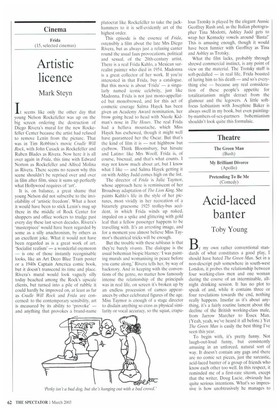Artistic licence
Mark Steyn
It seems like only the other day that young Nelson Rockefeller was up on the big screen ordering the destruction of Diego Rivera's mural for the new Rockefeller Center because the artist had refused to remove Lenin from the picture. That was in Tim Robbins's movie Cradle Will Rock, with John Cusack as Rockefeller and Ruben Blades as Rivera. Now here it is all over again in Frida, this time with Edward Norton as Rockefeller and Alfred Molina as Rivera. There seems no reason why this scene shouldn't be reprised over and over in film after film, since it sums up perfectly what Hollywood requires of 'art'.
It is, on balance, a great shame that young Nelson did not subscribe to the inviolability of 'artistic freedom'. What a hoot it would have been to stick Lenin's mug up there in the middle of Rock Center for shoppers and office workers to trudge past every day these last seven decades. Rivera's 'masterpiece' would have been regarded by some as a silly anachronism, by others as an excellent joke. What it would not have been regarded as is a great work of art. 'Socialist realism' — a wonderful oxymoron — is one of those instantly recognisable looks, like an Art Deco Blue Train poster or a 1940s Captain America comic book, but it doesn't transcend its time and place. Rivera's mural would look vaguely silly today beached among the Rock's upscale clients, but turned into a pile of rubble it could hardly be improved on, at least as far as Cradle Will Rock and Frida are concerned: to the contemporary sensibility, art is measured by its ability to 'provoke' — and anything that provokes a brand-name
plutocrat like Rockefeller to take the jackhammers to it is self-evidently art of the highest order.
This episode is the essence of Frida, ostensibly a film about the late Mrs Diego Rivera, but as always just a relaxing canter round the usual faux provocations, political and sexual, of the 20th-century artist. There is a real Frida Kahlo, a Mexican surrealist painter who died in 1954. Madonna is a great collector of her work. If you're interested in that Frida, buy a catalogue. But this movie is about 'Frida' — a singularly named iconic celebrity, just like Madonna. Frida is not just mono-appellated but monobrowed, and for this act of cosmetic courage Sa!ma Hayek has been given an Academy Award nomination, her brow going head to head with Nicole Kidman's nose in The Hours. The real Frida had a helluva moustache, which Miss Hayek has eschewed, though it might well have guaranteed her the Oscar. But that's the kind of film it is — not highbrow but eyebrow. Think Bloomsbury, but hirsute and Latino: like Mrs Woolf, Frida is, of course, bisexual, and that's what counts. I may not know much about art, but I know what I like — and Salma Hayek getting it on with Ashley Judd comes high on the list.
The director of Frida is Julie Taymor, whose approach here is reminiscent of her Broadway adaptation of The Lion King. She paints Kahlo's life in the style of her pictures, most vividly in her recreation of a bizarrely gruesome 1925 trolley-bus accident, in which Frida winds up naked, impaled on a spike and glittering with gold leaf that a fellow passenger happens to be travelling with. It's an arresting image, and for a moment you almost believe Miss Taymor's theatrical tricks will be enough.
But the trouble with these tableaux is that they're barely vivants. The dialogue is the usual bohemian biopic blarney: '1 was painting murals and womanising in peace before you came along,' Rivera tells her, by way of backstoty. And in keeping with the conventions of the genre, no matter how famously intense the relationship of the principals was in real life, on screen it's broken up by an endless procession of cameo appearances by other celebrated figures of the age. Miss Taymor is enough of a stage director to disdain anything so crass as physical similarity or vocal accuracy, so the squat, crapu
bus Trotsky is played by the elegant Aussie Geoffrey Rush and, as the Italian photographer Tina Modotti, Ashley Judd gets to wrap her Kentucky vowels around 'Basta!' This is amusing enough, though it would have been funnier with Geoffrey as Tina and Ashley as Trotsky.
What the film lacks, probably through shrewd commercial instinct, is any point of view on the material. The Trotsky stuff is soft-pedalled — in real life, Frida boasted of luring him to his death — and so's everything else — because any real consideration of these people's appetite for totalitarianism might detract from the glamour and the legovers. A little softfocus lesbianism with Josephine Baker is always swell in my book, but even paintingby-numbers-of-sex-partners bohemianism shouldn't look quite this formulaic.


















































































 Previous page
Previous page